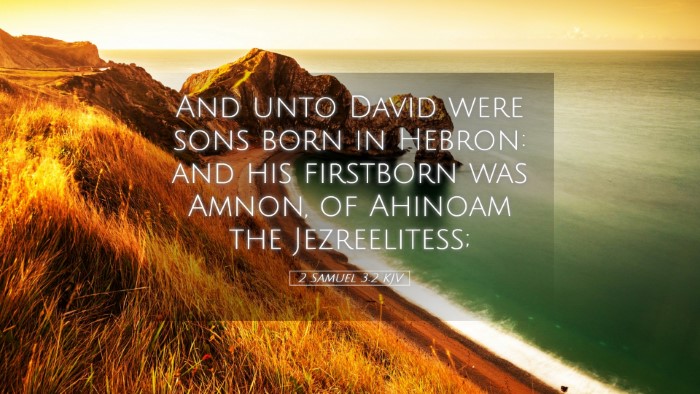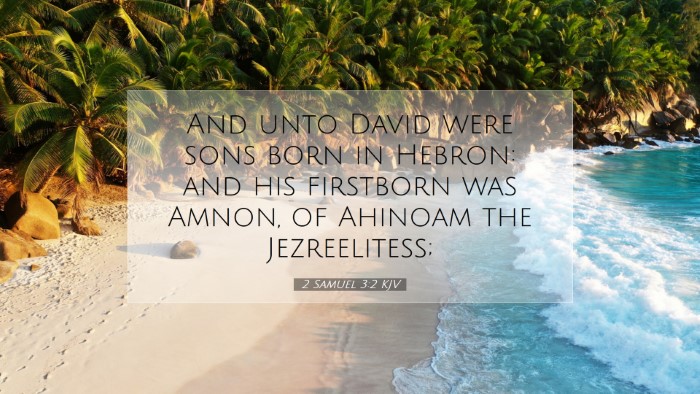Commentary on 2 Samuel 3:2
Verse: "And unto David were sons born in Hebron: and his firstborn was Amnon, of Ahinoam the Jezreelitess;"
Introduction
This passage is a significant moment in the narrative of David’s rise to kingship, providing insight into his familial relationships as well as the political landscape of Israel during this tumultuous period. This commentary seeks to elucidate the text by drawing from notable public domain commentaries, offering a composite of insights that serve pastors, students, and scholars alike.
Contextual Background
Following the death of Saul, the kingdom of Israel was divided. David had been anointed king over Judah, while Ishbosheth, Saul's son, ruled over Israel. The birth of David’s sons during this time of political strife indicates both a continuation of his household and the complexity of his claim to kingship. The mention of Hebron as a pivotal location underscores its historical and spiritual significance in Israel's history.
Insights from Matthew Henry
Matthew Henry notes that David's marriages and his sons' births during his reign in Hebron signify not only personal growth but also pragmatism in forming alliances through marriage. Each son's name can be reflective of the character traits or the situations surrounding their births, contributing layers to the understanding of David’s leadership and family dynamics.
Henry emphasizes that Amnon, being the firstborn, reflects the expectations and implications of primogeniture in Israelite culture, symbolizing David's ascent to prominence amidst division. The birth of strong heirs denotes stability as David consolidates power during a critical juncture.
Insights from Albert Barnes
Albert Barnes elaborates on the geopolitical context by highlighting that Hebron was a strategic military and civil center. By establishing his household there, David was fortifying his position as king over Judah and eventually over all Israel. Barnes stresses the importance of the choice of wives, pointing out that David’s marriages often reflected the alliances he was building with various groups, which would play a crucial role in his future reign.
Barnes also discusses Amnon's character, emphasizing that his birth heralded qualities expected of a firstborn son; yet it foreshadows the complexities and tragedies that family dynamics in David's household would face later in the narrative, particularly with the conflict that arises from Amnon's actions towards his half-sister Tamar.
Insights from Adam Clarke
Adam Clarke provides a detailed analysis of the implications of lineage and tribal affiliations, noting that Ahinoam, being a Jezreelitess, adds a socio-political layer. Her background reflects the merging of different tribal influences within Israel, illustrating David’s role in bridging divisions as he expanded his influence over both Judah and subsequent unification efforts with the northern tribes.
Clarke also points to the potential pitfalls of polygamy demonstrated in David's household, stating that it often leads to strife and rebellion. This foresight serves as a cautionary note for future leaders about the complexities of marital alliances and their societal implications.
Theological Reflections
This verse opens the door to deeper theological reflections on the nature of God’s covenant with David. From a theological perspective, the births of David’s sons during a time of conflict highlight God's providence and the unfolding of His plan through flawed yet chosen individuals. David, as a type of Christ, shows the importance of familial legacy in God’s ultimate redemptive history.
The complexity of David’s family dynamics foreshadows the challenges of leadership and governance, emphasizing that God works through human history, often amidst familial strife and personal shortcomings, to bring about His divine purposes.
Conclusion
2 Samuel 3:2 encapsulates a pivotal moment in Israel’s history and in the life of David, revealing much about personal, political, and theological themes. Scholars and pastors alike can draw lessons on the significance of leadership, the implications of choices made within the family structure, and the overarching narrative of God’s sovereignty in the midst of human challenges. This verse serves as a reminder that divine purpose is often achieved through the mundane and the complex realities of life.


